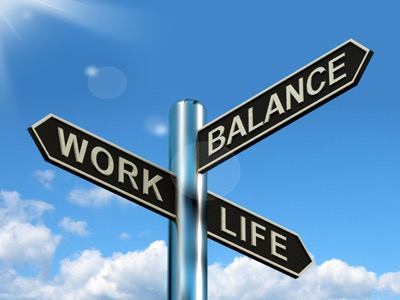
‘Work-life balance’ has certainly become a popular phrase over the past couple of years, and the more we hear about it, the more impossible it seems.
This is because there seems to be a general acceptance that it’s no longer achievable, with the consequences detailed for us to read on a daily basis.
We’re tired, unproductive and working longer hours, with endless surveys telling us how little time we have due to work pressures.
Let’s face it, it’s not uncommon now to set aside a couple of hours to catch up on emails on a Sunday, or have a specific day when we stay late in the office to regain control of to-do lists. Our lives no longer have a clear separation between work and home, with the 9-5pm seemingly dead.
Consequently, there’s a rising concern (from the media through to government) around people’s inability to balance their home and work life, as there no longer is a balance. More people are in work than ever before, which has led to an expectation that we need to produce more as a result. Due to advancements in technology, employees are expected to be more productive (as tasks should be quicker) and help the business increase its output, meaning work often seeps beyond contracted hours due to deadline pressures. Our mobile phones and laptops have paved the way for us to never truly leave work (mentally) and enable us to be reached at any hour of the day, even if we’re not required to be physically there at that time.
The effects of this attitude can sometimes be harrowing. Japan, for example, is a leading example of when overwork goes too far. The country is famous for its overstretched workers, who are expected to work long hours – so much so that overtime legislation has needed to be introduced to stop people working all hours of the day. The situation had become so dire that it is now affecting the Japanese birth-rate and a word has been developed to describe ‘death by overwork’, showing how a change in approach was needed.
Although this example may seem extreme, it’s an excellent way to contextualise exactly how out of control things can become when work-life balance is ignored. Whilst it’s undeniable that employers must take responsibility for their employees’ wellbeing, which is something we’re thankfully seeing in the UK, it’s also the responsibility of the employee to utilise their own skillset and keep their work-life balance in check: as ultimately we’re the ones in control of how we police our own time.
So, how does one take care of their work-life balance, in an ever-demanding world from which they can rarely switch off? The answer – by learning to integrate work and life, instead of trying to balance them: acknowledging that the two will always be intertwined, and acting accordingly. Ultimately, it’s about being present during your home time, in order to make the most of it. This creates a clear boundary between home and work, as by keeping them mentally separate, they can illicit different emotional reactions.
The fact of the matter is, downtime improves our emotional wellbeing. We feel happier and re-energised, ready for the next working day or week. As our brains rest, information we’ve learnt unconsciously sinks in, improving our performance at work and our overall focus. Therefore, having the confidence to leave on time or say no to a last minute request as you walk out the door could be helpful in the long run.
This separation is key to work-life integration: being able to focus on what’s in front of us, and recognising that we can reject requests if they’ll negatively impact our ability to focus on either our home or work lives, respectively.
Striking a healthy balance – whatever ratio of home to work time that may be – comes from utilising time wisely and following age old advice. Find time in your day to eat healthily, rehydrate and get fresh air: this can easily all be incorporated into a lunch break. This can be especially beneficial as exercise relieves tension, releasing feel-good endorphins and improving or stabilising your mood.
Employers are realising the perils of overwork and as the UK grapples with its poor productivity rate, a change in approach is needed. This is not a one-way process, however, and individuals are just as responsible as employers in making the change. This means setting boundaries and sticking to them, to help yourself as much as possible. No one can work long hours consistently, so if you want to climb to the top of the career ladder, listen to your body, take a rest and use your energy in concerted bursts of effort. If we continuously try to integrate our work and personal life in a responsible and reasonable way, we won’t only benefit ourselves: we’ll benefit those we care about and the organisation we work for too.
About the author
This article was provided by Laura Little, Learning and Development Manager at CABA.








